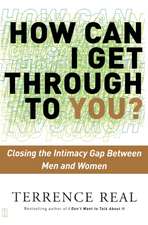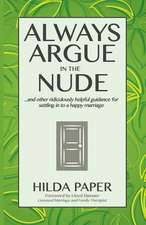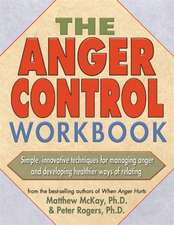The New Rules of Marriage: What You Need to Know to Make Love Work
Autor Terrence Realen Limba Engleză Paperback – 31 dec 2007
Vezi toate premiile Carte premiată
Books for a Better Life (2007)
Women have changed in the last twenty-five years–they have become powerful, independent, self-confident, and happy. Yet many men remain irresponsible and emotionally detached. They don’t know how to respond to frustrated partners who just want their mates to show up and grow up.
Enter the good news: In this revolutionary book, Real shows women how to master the new rules of twenty-first-century marriage by offering them a set of effective tools with which they can create the truly intimate relationship that they desire and deserve. He identifies five non-starters to avoid and shares practical strategies for bringing honesty, passion, and joy back to even the most difficult relationship. Using his experience helping thousands of couples shift from despair to profound emotional closeness, Real guides you through the process of relationship repair with exercises that you can do alone or with your partner. With this program you’ll discover how to
- identify and articulate your wants and needs
- listen well and respond generously
- set limits, and stand up for yourself
- embrace and appreciate what you have
- know when to seek outside help
The New Rules of Marriage will introduce you to a radically new kind of relationship, one based on the idea that every woman has the power to transform her marriage, while men, given the right support, have it in them to rise to the occasion.
We have never wanted so much from our relationships as we do today. More than any other generation, we yearn for our mates to be lifelong friends and lovers. The New Rules of Marriage shows us how to fulfill this courageous and uncompromising new vision.
From the Hardcover edition.
Preț: 95.89 lei
Nou
Puncte Express: 144
Preț estimativ în valută:
18.35€ • 19.16$ • 15.19£
18.35€ • 19.16$ • 15.19£
Carte disponibilă
Livrare economică 14-28 martie
Preluare comenzi: 021 569.72.76
Specificații
ISBN-13: 9780345480866
ISBN-10: 0345480864
Pagini: 295
Dimensiuni: 133 x 201 x 17 mm
Greutate: 0.23 kg
Editura: BALLANTINE BOOKS
ISBN-10: 0345480864
Pagini: 295
Dimensiuni: 133 x 201 x 17 mm
Greutate: 0.23 kg
Editura: BALLANTINE BOOKS
Recenzii
Advance praise for The New Rules of Marriage
“Terry Real helps overturn old-fashioned, confining roles and opens up a treasury of hope for lasting and exciting intimacy for couples everywhere. This is a wonderful, joyful, and highly useful book.”
–Edward Hallowell, M.D., author of Crazy Busy
“Falling in love is easy, staying in love is another matter. Couples yearning for more closeness are truly in uncharted territory . . . until now, that is. This book offers amazing new insights about men and women and what it takes to make relationships work in our ever-changing culture.”
–Michele Weiner-Davis, MSW, author of Divorce Busting
“If you’re tired of the same old dance, get ready to learn a few new steps–real steps–the ones that will make a difference in your life and the lives of those you love.”
–Cheryl Richardson, author of Life Makeovers
“Terrence Real offers a brilliant, winning strategy for achieving the full-tilt, authentic, exhilarating connection both women and men crave. Real’s revolutionary program is sure to lead them to it–with the dignity, fairness, and humor that characterizes his work.”
–Dalma Heyn, author of Drama Kings
“An amazing guide to developing powerful relational skills. It is served up with great wit and a keen sense of humor–a great read.”
–Pia Mellody, author of Facing Love Addiction and The Intimacy Factor
“Groundbreaking, insightful, funny, this book brings readers the inside scoop. Sharing the deep and simple truths, it offers us practical wisdom everybody can use to make love work.”
–Bell Hooks, author of All About Love: New Visions
From the Hardcover edition.
“Terry Real helps overturn old-fashioned, confining roles and opens up a treasury of hope for lasting and exciting intimacy for couples everywhere. This is a wonderful, joyful, and highly useful book.”
–Edward Hallowell, M.D., author of Crazy Busy
“Falling in love is easy, staying in love is another matter. Couples yearning for more closeness are truly in uncharted territory . . . until now, that is. This book offers amazing new insights about men and women and what it takes to make relationships work in our ever-changing culture.”
–Michele Weiner-Davis, MSW, author of Divorce Busting
“If you’re tired of the same old dance, get ready to learn a few new steps–real steps–the ones that will make a difference in your life and the lives of those you love.”
–Cheryl Richardson, author of Life Makeovers
“Terrence Real offers a brilliant, winning strategy for achieving the full-tilt, authentic, exhilarating connection both women and men crave. Real’s revolutionary program is sure to lead them to it–with the dignity, fairness, and humor that characterizes his work.”
–Dalma Heyn, author of Drama Kings
“An amazing guide to developing powerful relational skills. It is served up with great wit and a keen sense of humor–a great read.”
–Pia Mellody, author of Facing Love Addiction and The Intimacy Factor
“Groundbreaking, insightful, funny, this book brings readers the inside scoop. Sharing the deep and simple truths, it offers us practical wisdom everybody can use to make love work.”
–Bell Hooks, author of All About Love: New Visions
From the Hardcover edition.
Extras
Chapter One
Are You Getting What You Want?
Outgrowing the Old Rules
Are you happy with the relationship you’re in today? Or are you frustrated, knowing that no matter how hard you try, the open-heartedness that first drew you and your partner together seems awfully hard to win back? Perhaps you’re in a difficult relationship that needs substantial change, or perhaps you are in a good-enough relationship that could be made better. Maybe you’re looking for a new relationship that doesn’t repeat the mistakes of the past. In any case, if you are reading these words, chances are you feel that something has been missing. It may be tempting to avoid acknowledging that feeling, but I’d like to ask you to trust your instinct. Twenty-five years of helping couples change and grow has taught me that if you feel things could be better, you’re probably right. A lot better, in fact.
People may tell you that what you’re looking for is unrealistic. I don’t think so. Well-meaning friends and family may focus on your need to compromise. I don’t want you to. Your relationship is too important for compromise. Your work may be rewarding, your kids great, and your friends wonderful, but in the end, your bond with the person you live out your life with—the one you grow up and grow old with—is the single most important connection you will ever have. I want you to go after what it is that you want—with skill and with love—and get it.
Both in counseling couples and in workshops I’ve lead around the country, I have taught people from all walks of life how to turn bad relationships into good ones, and good relationships into great ones. Because great is what you’re really after. Great is what you deserve. Not merely a relationship you can live with, but one that is truly alive—passionately, tenderly, maddeningly filled to the brim with unexpected twists and turns, with comfort and solidity, with the sense of knowing and being known, and loving one another anyway. How do you get such a relationship? You don’t get it, you build it, thoughtfully and skillfully, brick by brick.
Do you have the skills to do this? Have you been taught the craft of creating and sustaining a truly great relationship? If you’re like most of us, your upbringing—that curious mixture of what you’ve picked up about how to be close from society in general and from your family in particular—has not only failed to give you the tools you need, but has actively filled your head with a bunch of unhelpful nonsense. Nonsense like “You’d better not make him too angry.” Or, “If she really loved me, she’d . . .” Or, “I could be happy if only you’d . . .”
Like a tennis player who’s performed well enough with rotten technique, in order to master relationships you don’t just have to learn how to do it; first you have to unlearn all your bad habits. Think of me as your intimacy coach. Together, we’re going to strip down your usual relationship routines and redo them, from the very basics. Will it be comfortable? Probably not. If it is, it means I’m not doing my job. Imagine going out on a tennis court with a totally new grip after years of holding your racquet in one familiar way. Comfortable? No. But does the new, proper grip give you a more effective stroke? Once you get used to it, there’s no comparison.
Reading this, a part of you may be wondering, “Has the game of love really grown so technical that I need an intimacy coach just to have a decent relationship? Whatever happened to falling in love and, well . . . just getting along?” That kind of spontaneity is fine—if it’s working for you. Ask yourself: Is it? If you’re like most people, the honest answer is somewhere between a definite no and “Not as well as I wish it would.” If that’s the case, don’t be embarrassed; you’re in an awfully big boat. The truth is that navigating your relationship by simply doing what “comes naturally” actually stacks the odds against achieving lasting happiness. Roughly half of all marriages fail altogether, and of those marriages left standing, how many are really fulfilling? How many truly great relationships do you see around you? Everywhere you turn, it seems that people who can be terrific parents, friends, workers, and neighbors fall short in the one arena that matters the most. As if that weren’t sobering enough, consider this: The grim picture of relationships I’m describing has been relatively stable for the last forty years. The emergence of couple’s therapy in the 1950s has done nothing to change it. Self-help and psychology haven’t put a dent in it. Multimillion-dollar government programs and church initiatives have been helpless in the face of our current intimacy crisis. What is going on?
Twenty-first Century Love
Try as they might, most “experts” aren’t helping much because they fail to address the fundamental issue. What’s robbing your relationship of the closeness and passion you deserve is history; or, more precisely, your particular moment in history. If you are like the millions of men and women who feel dissatisfied, you have been trying to negotiate a twenty-first century relationship using twentieth-century skills. Your expectations of what an intimate relationship is—emotional sharing, mutual support, responsibility, vitality—belong to a new kind of marriage, one very different from your parents’ or grandparents’. But your old rule book, and your bag of relationship tools—your game plan and ways of coping—are not nearly as fresh as your vision is.
The Big Picture: Where Are We Now?
One of the reasons why men and women are so frustrated and confused with one another is that the nature of marriage itself is undergoing a sea of change.
In the beginning of the twentieth century, with the coming of the industrial revolution, men left their farms in droves and moved into the city to work. Before urbanization everyone pitched in together in all sorts of ways, but from then on men began working away from their families while women and children stayed home. The great roles for men and women of the twentieth century were forged: Man-the-Breadwinner and Woman-the-Caretaker. Both at home and in school, children were raised to have character traits that suited these roles. Boys learned to be strong, goal oriented, and competitive; girls learned to be caring, emotional, and cooperative. For at least fifty years, this arrangement, if not always equally rewarding for both partners, was nevertheless largely stable. Through the 1950s and well into the 1960s, divorce was exceptional, and in all but the most extreme cases, if marital unhappiness existed, it was kept discreetly behind closed doors.
In the second half of the twentieth century, the sleeping giant of half the population began to wake up. Starting in the 1970s and mov- ing with accelerating pace, women became the largest addition to the workforce. Women gained economic freedom, political power, a new psychology, and a collective drive to support feminine strength and independence. The women’s movement changed our society forever.
Newly empowered, women across America turned to men and began insisting on levels of emotional intimacy that most men—raised under the old regime—were not readily able to meet.
The reason why things have been so difficult between men and women in the last several decades can be pared down to this: In the last generation women have radically changed and men, by and large, have not. This is not a criticism of men. It is a simple fact.
If Woman the Caretaker was compliant and repressed, the new Liberated Woman was armed and angry, leaving many men feeling unappreciated and bewildered. “What do they want from us?” men asked. “Why can’t they accept us for who we are?” On the women’s side, finding a “good man,” a man who “got it,” seemed to grow more and more difficult. If the ancient Greeks identified with heroic Odysseus setting sail for adventure, we moderns cheer on Carrie, Samantha, Charlotte, and Miranda of Sex and the City, as they quest for a satisfying heterosexual relationship, or as Charlotte once put it, “to dream the impossible dream!”
What most of the men I work with don’t “get” is that their relationship job description has changed. According to the unspoken rules governing traditional twentieth-century marriage if a man was a reliable provider, a steady hand, and didn’t drink a lot or beat anyone, he was a good husband. A generation ago, if a woman went to her mother and complained of such a spouse that “He never takes my feelings seriously,” or “He puts me down in public,” or “He’s so shut down I feel like I live with a stranger,” what do you imagine she would have been told? Stop whining, suck it up, and go home—of course! But we have outgrown those rules, and now it is just such quality-of-relationship issues that break up modern couples—or, perhaps worse, render a once loving union chronically miserable. Just as women’s roles have radically changed, so, too, have their expectations of long-term relationships. While many men would be delighted if women retained more of their traditional caretaker role, most women need men to be more than providers. The refrain I hear over and over again from dissatisfied women is “I don’t feel like I have a real partner.” A partner who shares in the details of domestic life and in her concerns about the kids. An intellectual partner who cares about what she thinks and supports her development. And most of all, an emotional partner who shows interest in and appreciation for her feelings and who has a few feelings of his own to bring to the table. As women join their husbands as workers, as they step beyond the confines of their caretaker role, they redefine the rules of marriage and of relationship itself. The breadwinner/caretaker paradigm of marriage that came into existence at the beginning of the twentieth century ended at the century’s close.
The twentieth-century marriage was traditional in the sense that, like marriage for centuries before, happiness meant, above all, being good companions. Husband and wife pulled in harness together. Shoulder to shoulder, they faced life’s challenges, raised their kids, paid their taxes, and faced war and deprivation, good times and bad. No one seriously expected marriage to be passionate, or thought about long, complicated, exquisite communication. That was the stuff of romance. And romance was for kids, for the start of relationships, before things settled down, or, in some instances, for love affairs. But, as we faced a new millennium, women began to want more.
The new marriage takes the stability, the building of a life together, that was the whole of marriage a generation ago, and grafts onto it the expectations of a lifelong romance—deep talks, exciting times, and great sex.
Contemporary women want to be more than companions with their spouses; they want to remain friends and lovers. If the twentieth-century marriage was companionable, the new marriage is intimate—physically, sexually, intellectually, and, above all, emotionally.
The fly in the ointment is that while some men might be thrilled if their wives remained as sexually provocative and generous as a mistress, the rest of the new package—particularly emotional closeness—leaves them feeling inadequate and mystified, if not downright put-upon. And while women’s new empowerment may well equip them to stand up for themselves, it does a terrible job of teaching them how to stand up for the relationship.
From the Hardcover edition.
Are You Getting What You Want?
Outgrowing the Old Rules
Are you happy with the relationship you’re in today? Or are you frustrated, knowing that no matter how hard you try, the open-heartedness that first drew you and your partner together seems awfully hard to win back? Perhaps you’re in a difficult relationship that needs substantial change, or perhaps you are in a good-enough relationship that could be made better. Maybe you’re looking for a new relationship that doesn’t repeat the mistakes of the past. In any case, if you are reading these words, chances are you feel that something has been missing. It may be tempting to avoid acknowledging that feeling, but I’d like to ask you to trust your instinct. Twenty-five years of helping couples change and grow has taught me that if you feel things could be better, you’re probably right. A lot better, in fact.
People may tell you that what you’re looking for is unrealistic. I don’t think so. Well-meaning friends and family may focus on your need to compromise. I don’t want you to. Your relationship is too important for compromise. Your work may be rewarding, your kids great, and your friends wonderful, but in the end, your bond with the person you live out your life with—the one you grow up and grow old with—is the single most important connection you will ever have. I want you to go after what it is that you want—with skill and with love—and get it.
Both in counseling couples and in workshops I’ve lead around the country, I have taught people from all walks of life how to turn bad relationships into good ones, and good relationships into great ones. Because great is what you’re really after. Great is what you deserve. Not merely a relationship you can live with, but one that is truly alive—passionately, tenderly, maddeningly filled to the brim with unexpected twists and turns, with comfort and solidity, with the sense of knowing and being known, and loving one another anyway. How do you get such a relationship? You don’t get it, you build it, thoughtfully and skillfully, brick by brick.
Do you have the skills to do this? Have you been taught the craft of creating and sustaining a truly great relationship? If you’re like most of us, your upbringing—that curious mixture of what you’ve picked up about how to be close from society in general and from your family in particular—has not only failed to give you the tools you need, but has actively filled your head with a bunch of unhelpful nonsense. Nonsense like “You’d better not make him too angry.” Or, “If she really loved me, she’d . . .” Or, “I could be happy if only you’d . . .”
Like a tennis player who’s performed well enough with rotten technique, in order to master relationships you don’t just have to learn how to do it; first you have to unlearn all your bad habits. Think of me as your intimacy coach. Together, we’re going to strip down your usual relationship routines and redo them, from the very basics. Will it be comfortable? Probably not. If it is, it means I’m not doing my job. Imagine going out on a tennis court with a totally new grip after years of holding your racquet in one familiar way. Comfortable? No. But does the new, proper grip give you a more effective stroke? Once you get used to it, there’s no comparison.
Reading this, a part of you may be wondering, “Has the game of love really grown so technical that I need an intimacy coach just to have a decent relationship? Whatever happened to falling in love and, well . . . just getting along?” That kind of spontaneity is fine—if it’s working for you. Ask yourself: Is it? If you’re like most people, the honest answer is somewhere between a definite no and “Not as well as I wish it would.” If that’s the case, don’t be embarrassed; you’re in an awfully big boat. The truth is that navigating your relationship by simply doing what “comes naturally” actually stacks the odds against achieving lasting happiness. Roughly half of all marriages fail altogether, and of those marriages left standing, how many are really fulfilling? How many truly great relationships do you see around you? Everywhere you turn, it seems that people who can be terrific parents, friends, workers, and neighbors fall short in the one arena that matters the most. As if that weren’t sobering enough, consider this: The grim picture of relationships I’m describing has been relatively stable for the last forty years. The emergence of couple’s therapy in the 1950s has done nothing to change it. Self-help and psychology haven’t put a dent in it. Multimillion-dollar government programs and church initiatives have been helpless in the face of our current intimacy crisis. What is going on?
Twenty-first Century Love
Try as they might, most “experts” aren’t helping much because they fail to address the fundamental issue. What’s robbing your relationship of the closeness and passion you deserve is history; or, more precisely, your particular moment in history. If you are like the millions of men and women who feel dissatisfied, you have been trying to negotiate a twenty-first century relationship using twentieth-century skills. Your expectations of what an intimate relationship is—emotional sharing, mutual support, responsibility, vitality—belong to a new kind of marriage, one very different from your parents’ or grandparents’. But your old rule book, and your bag of relationship tools—your game plan and ways of coping—are not nearly as fresh as your vision is.
The Big Picture: Where Are We Now?
One of the reasons why men and women are so frustrated and confused with one another is that the nature of marriage itself is undergoing a sea of change.
In the beginning of the twentieth century, with the coming of the industrial revolution, men left their farms in droves and moved into the city to work. Before urbanization everyone pitched in together in all sorts of ways, but from then on men began working away from their families while women and children stayed home. The great roles for men and women of the twentieth century were forged: Man-the-Breadwinner and Woman-the-Caretaker. Both at home and in school, children were raised to have character traits that suited these roles. Boys learned to be strong, goal oriented, and competitive; girls learned to be caring, emotional, and cooperative. For at least fifty years, this arrangement, if not always equally rewarding for both partners, was nevertheless largely stable. Through the 1950s and well into the 1960s, divorce was exceptional, and in all but the most extreme cases, if marital unhappiness existed, it was kept discreetly behind closed doors.
In the second half of the twentieth century, the sleeping giant of half the population began to wake up. Starting in the 1970s and mov- ing with accelerating pace, women became the largest addition to the workforce. Women gained economic freedom, political power, a new psychology, and a collective drive to support feminine strength and independence. The women’s movement changed our society forever.
Newly empowered, women across America turned to men and began insisting on levels of emotional intimacy that most men—raised under the old regime—were not readily able to meet.
The reason why things have been so difficult between men and women in the last several decades can be pared down to this: In the last generation women have radically changed and men, by and large, have not. This is not a criticism of men. It is a simple fact.
If Woman the Caretaker was compliant and repressed, the new Liberated Woman was armed and angry, leaving many men feeling unappreciated and bewildered. “What do they want from us?” men asked. “Why can’t they accept us for who we are?” On the women’s side, finding a “good man,” a man who “got it,” seemed to grow more and more difficult. If the ancient Greeks identified with heroic Odysseus setting sail for adventure, we moderns cheer on Carrie, Samantha, Charlotte, and Miranda of Sex and the City, as they quest for a satisfying heterosexual relationship, or as Charlotte once put it, “to dream the impossible dream!”
What most of the men I work with don’t “get” is that their relationship job description has changed. According to the unspoken rules governing traditional twentieth-century marriage if a man was a reliable provider, a steady hand, and didn’t drink a lot or beat anyone, he was a good husband. A generation ago, if a woman went to her mother and complained of such a spouse that “He never takes my feelings seriously,” or “He puts me down in public,” or “He’s so shut down I feel like I live with a stranger,” what do you imagine she would have been told? Stop whining, suck it up, and go home—of course! But we have outgrown those rules, and now it is just such quality-of-relationship issues that break up modern couples—or, perhaps worse, render a once loving union chronically miserable. Just as women’s roles have radically changed, so, too, have their expectations of long-term relationships. While many men would be delighted if women retained more of their traditional caretaker role, most women need men to be more than providers. The refrain I hear over and over again from dissatisfied women is “I don’t feel like I have a real partner.” A partner who shares in the details of domestic life and in her concerns about the kids. An intellectual partner who cares about what she thinks and supports her development. And most of all, an emotional partner who shows interest in and appreciation for her feelings and who has a few feelings of his own to bring to the table. As women join their husbands as workers, as they step beyond the confines of their caretaker role, they redefine the rules of marriage and of relationship itself. The breadwinner/caretaker paradigm of marriage that came into existence at the beginning of the twentieth century ended at the century’s close.
The twentieth-century marriage was traditional in the sense that, like marriage for centuries before, happiness meant, above all, being good companions. Husband and wife pulled in harness together. Shoulder to shoulder, they faced life’s challenges, raised their kids, paid their taxes, and faced war and deprivation, good times and bad. No one seriously expected marriage to be passionate, or thought about long, complicated, exquisite communication. That was the stuff of romance. And romance was for kids, for the start of relationships, before things settled down, or, in some instances, for love affairs. But, as we faced a new millennium, women began to want more.
The new marriage takes the stability, the building of a life together, that was the whole of marriage a generation ago, and grafts onto it the expectations of a lifelong romance—deep talks, exciting times, and great sex.
Contemporary women want to be more than companions with their spouses; they want to remain friends and lovers. If the twentieth-century marriage was companionable, the new marriage is intimate—physically, sexually, intellectually, and, above all, emotionally.
The fly in the ointment is that while some men might be thrilled if their wives remained as sexually provocative and generous as a mistress, the rest of the new package—particularly emotional closeness—leaves them feeling inadequate and mystified, if not downright put-upon. And while women’s new empowerment may well equip them to stand up for themselves, it does a terrible job of teaching them how to stand up for the relationship.
From the Hardcover edition.
Descriere
Nationally bestselling author and distinguished therapist Terry Real shows women how they can have the intimate marriages they have always wanted with a step-by-step plan.
Notă biografică
Terrence Real
Premii
- Books for a Better Life Finalist, 2007




















